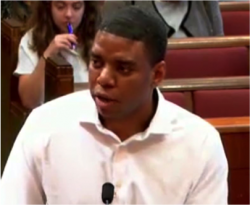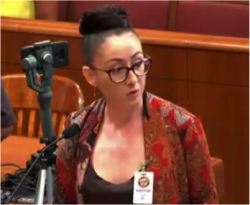
Houston Must Support Young People by Decriminalizing Its Juvenile Curfew
With the Houston City Council set to vote on its juvenile curfew ordinance July 17, we have spearheaded a juvenile justice coalition made up of a wide range of advocates.Our goal has been to support young people and provide education about the harms of curfew ordinances to ultimately end unnecessary policies that do nothing to benefit youth.See below how you can join us at a public hearing July 10.


Background
The juvenile curfew ordinance was initially established in the early 90s under the impression that it would deter youth from crime. However, a systematic review of research on juvenile curfew programs from 2016 examined 7,000 of these policies across the country (including Houston) and concluded that “juvenile curfews are ineffective at reducing crime and victimization.” Texas state law requires municipalities to review their ordinance every three years to either renew, modify or let it expire, and requiring two public hearings before a decision is made. However, many people have little to no knowledge about its existence, including local government officials. With the help of Texas Appleseed and other advocacy groups, there is a movement to re-examine this flawed policy and look for alternatives, that don’t resort to criminalization. So far, Waco, Austin, and San Antonio have either removed or modified their ordinances to decriminalize the curfew — but we still have a long way to go.
After meeting with the City of Houston Mayor and Council Members, most of them strongly believe that the curfew ordinance is an important tool for police to interact with youth and ensure their safety, although there seems to be broad agreement to eliminate the daytime portion of the curfew. Council has indicated that it plans to keep the nighttime portion with modifications.
Even without a curfew ordinance, police still have the ability to approach and offer assistance to youth who might be at risk. Police can still aid a young person in need, law enforcement can still refer a young person to helpful services, and they can arrest someone committing a crime. They can also detain and question anyone if they have reasonable suspicion or probable cause that there is criminal activity occurring.
Negative Effects of the Curfew
Right now, a young person who is out during curfew hours can get ticketed — a Class C Misdemeanor. They are sent to adult criminal court, may be required to pay fines, and end up with a criminal record that is permanent — greatly limiting access to jobs, housing and military service in the future. A young person who is homeless, fleeing an abusive home or is a victim of human trafficking does not need a ticket and a fine — that young person needs support and help. Young people working late hours or those returning from a friend or relative’s house also shouldn’t be criminalized with tickets.
Youth safety is put at risk when youth lack the support they need for stability, and criminalizing them for a curfew violation only destabilizes them and places them at greater risk. Shared Hope International, a non-profit organization focused on the prevention of human trafficking, emphasizes the need to develop protective responses and avenues to connect youth to services rather than punishment; eliminating the criminalization of juveniles for conduct that is inherently non-criminal remains a fundamental and indispensable element for this effort.
Houston has already acknowledged this in other contexts by developing a Law Enforcement Assisted Diversion (LEAD) program at Attucks Middle School for students accused of committing misdemeanors and some felonies. Instead of arresting youth for minor offenses committed at school, they are instead diverted to services, all with no criminal justice record of either arrest, citation, or conviction. Instead of renewing a counterproductive juvenile curfew ordinance, Houston could easily expand access to these kinds of pre-court diversion programs.
Possible Modifications to the Curfew Ordinance
Despite best efforts to convince Council that the curfew is ineffective for youth safety, it’s clear that they intend to renew and modify the ordinance. Thus far, they are deliberating the following modifications:
1) Removing the daytime curfew during school hours, and
2) Deferring youth from adult municipal court to teen court.
Recommended Solutions to Current Ordinance
As advocates, we applaud any move to end the daytime curfew — it penalizes students who may have alternative school hours or students who are home-schooled. It also conflicts with statewide reforms enacted in 2015, when the Texas Legislature ended truancy as a criminal offense and created an alternative, civil process for students accused of truancy. Although the best solution remains allowing the juvenile curfew to expire altogether, if the Houston City Council decides to renew it with modifications, they should consider these alternatives:
- Give youth, whose sole offense is violating the curfew, the opportunity to avoid altogether receiving a record of arrest, citation, or adult criminal court proceedings. The Youth LEAD program models an approach that could be used, especially for youth who may be victims. Under the LEAD program, a report is generated, but not filed, and there is no court appearance.
- Eliminate fines for violation of the curfew ordinance, with only community service as a potential consequence. The penalty of fines combined with court fees are a heavy burden for many families in Houston, and if unpaid, can cause financial hardship and a cycle of debt down the road.
- Require that police issue multiple warnings before citing youth under the juvenile curfew ordinance;
- Automatic waivers of any fines for indigent youth;
- Regular data collection to identify potential racial disparities in the enforcement of the curfew and to update whether it is achieving any law enforcement goals. This should consist of quarterly reports of curfew interventions, referrals, warnings, citations, penalties, waivers, expungements, and demographics (including race, ethnicity, age, gender, location, etc).
An amazing group of advocates and affected youth have joined Texas Appleseed in our calls for Houston to decriminalize the juvenile curfew. We hope that Houston City Council will listen.
Join Us!
The second public hearing takes place on July 10 at 9 a.m.
Houston City Hall, 2nd Floor
901 Bagby Street, Houston, TX 77002
To sign up to speak, please call the Office of the City Secretary at 832-393-1100 by 8:30 a.m. on July 10. Be sure to refer to the juvenile curfew ordinance and ask for 1-3 minutes of speaking time.
Alsovisit our Facebook event page for details.
Photo Captions:Destin Germany (left) and Kristian Caballero (right), with Texas Appleseed, speak at the Houston City Council hearing on June 26, 2019, against the renewal of the juvenile curfew.